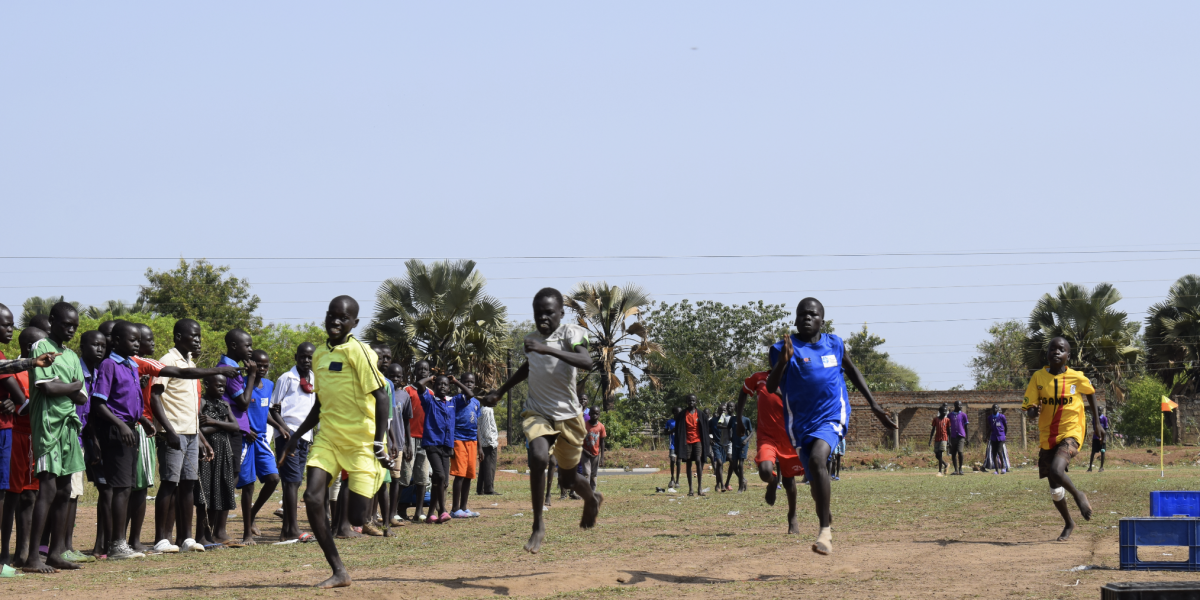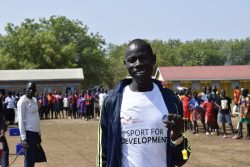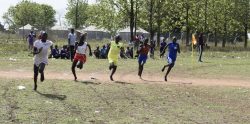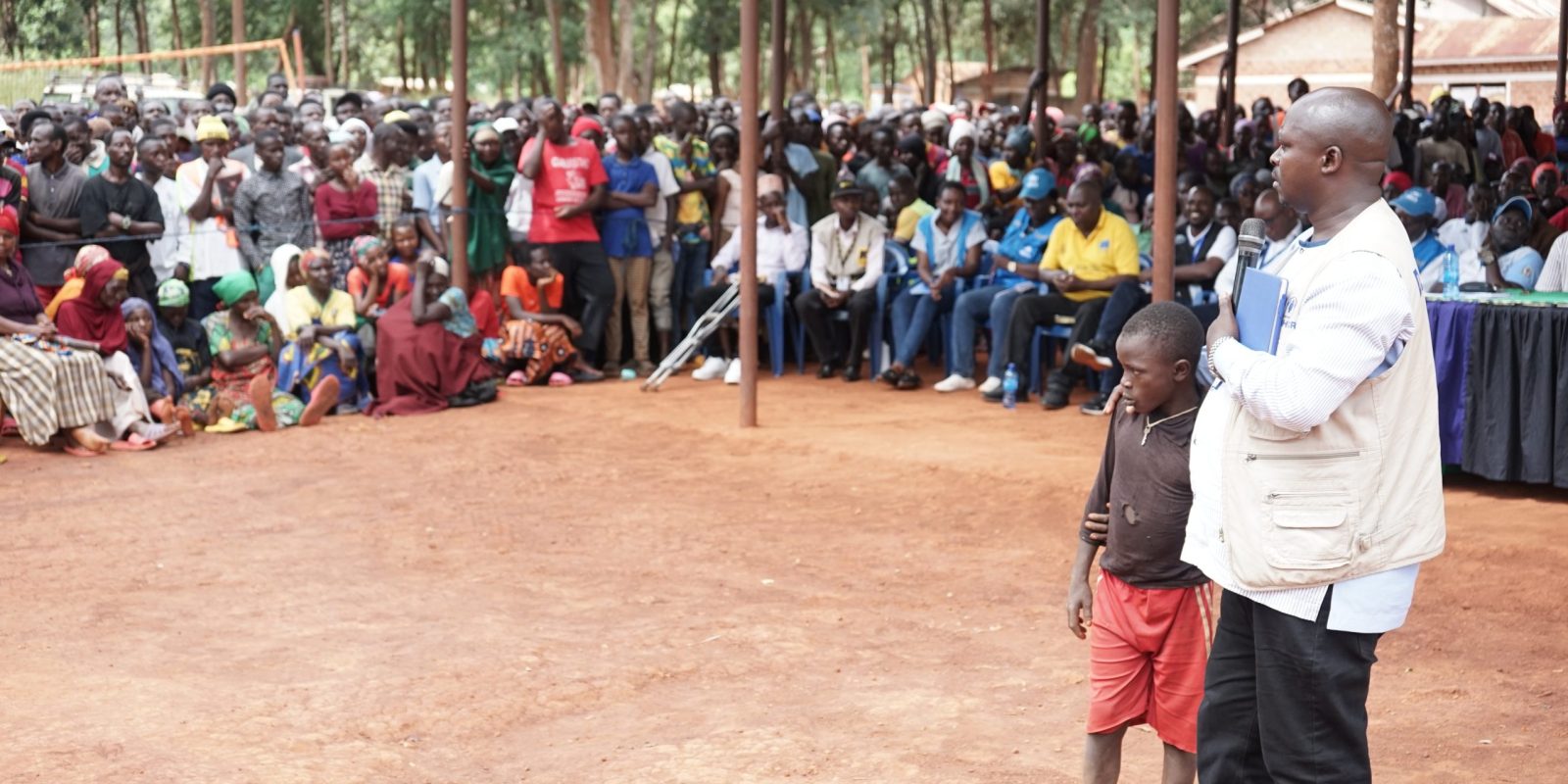Facilitating peace through sports in Adjumani
06 April 2022|Avola Tabitha

Primary schools in Uganda have been carrying out competitions in athletics, jumping and throwing games from mid-March. Eriga Tobias Igama, 26, is a Ugandan teacher at Nyumanzi primary School, Nyumanzi refugee settlement, Adjumani district. He is a Sports master and sports coach.
Eriga Tobias was among the 89 primary school teachers that participated in the sports for protection program, a youth sports facilitator course under Jesuit Worldwide Learning (JWL). The program trains refugee and host community facilitators to create, manage and sustain a youth sports program in marginalised communities with an emphasis on forcibly displaced populations.
We had a discussion with Mr Eriga Tobias during the Dzaipi sub county zonal games held at Dzaipi primary school. Five zones competed and the winners will represent the sub county in the finals on 6thApril 2022.

How is sports fostering peace?
Nyumanzi Primary School is an integrated school with pupils from both the host and refugee communities. When the refugees first came in the country, there were a lot of conflicts because of the poor communication. Sometimes we would say something they do not understand, and it takes so little to spark them into violence.
During sports and training, we combine all the children to form teams because we realised it fosters relations between them. Also it creates peace since they are in the team for the same goal.
In my school, the refugees are more than the children from the host communities, with a higher population of refugees in all the classes. With time, they have become more friendly and open and even know each other by name. Several refugee pupils participate in the sports events.
What impact have you seen arise from participation in sports?
Sports brings about peace, unity and socialisation. I have seen the attitudes of the people in my community change from the negative to positive towards refugees. I have seen the way it brings people together. In my community in Arinyapii sub county which neighbours the settlement, I have been instrumental in organising the youth to form a football team together with the refugees.
In 2013 when the refugees first came to Nyumanzi, they had a lot of insecurities and could easily erupt in violence. The host community members too were sceptic, but now they are used to the environment and the people. Whenever issues arise, leaders from both communities come together to resolve the issues amicably.
For these school competitions, we select students first through class competitions, and then inter-school, division and district and inter-district competitions. The best sports students represent the school.
Last year when we got sports materials donated by JRS and UNHCR, it boosted the morale of the children a lot. We are excited to participate in sports and have an identifying uniform.
The winners of this primary school competitions in Adjumani district will represent the district in the national competitions held in Mbale district in May 2022.
How has the sports for protection course in which you participated impacted on you?
Participating in the sports for protection training program opened me to many opportunities. After completing the course, I got an opportunity and was trained as a coach by GIZ. We got technical skills in activities like athletics, jumps and throws, and techniques for organising sports events and training. Last year, the school appointed me the sports master because of the skills and capability I had achieved with the sports for protection training.
When we received the training, we were tasked to share this knowledge with fellow teachers. In the sports department, there are two teachers who assist me and I have been sharing the training that I got with them.

Have you faced any challenges as the sports master and coach?
Yes, the cultural norms of the refugees deter girls form participating in sports. For the competitions, we have been moving to the homes along with RWCs (Refugee Welfare Committee) requesting parents to let their daughters participate. Parents have a negative attitude towards girl’s participation in sports.
When we come for the sports activities, girls do not have changing rooms and this is a big issue for them.
Mobilisation of the children is hard especially during trainings, at times we get challenged when the talented pupils do not want to participate. We also lack refreshments in the field, these sports activities are facilitated by the schools within the zone, but it is not enough to cater for all the children.
What are your plans for the future?
I would like to upgrade and pursue a degree in sports education. I have experienced the advantage of sports and how it impacts on the community and on peaceful coexistence.
After the competition, we would to appeal to the school to offer bursaries to the best performing sports students so as to motivate the rest. Our next challenge is to identify the students who will take over the position of the older ones currently participating in the ‘Under 16’ category.
About the sports for protection course
The Youth Sports Facilitator (YSF), a professional certificate course under Jesuit Worldwide Learning, certified by Metropolitan State University of Denver (USA), trained refugee and host community facilitators to create, manage and sustain a youth sports program in marginalized communities with an emphasis on forcibly displaced populations. Jesuit Refugee Service facilitated the program with funding from UNHCR.



